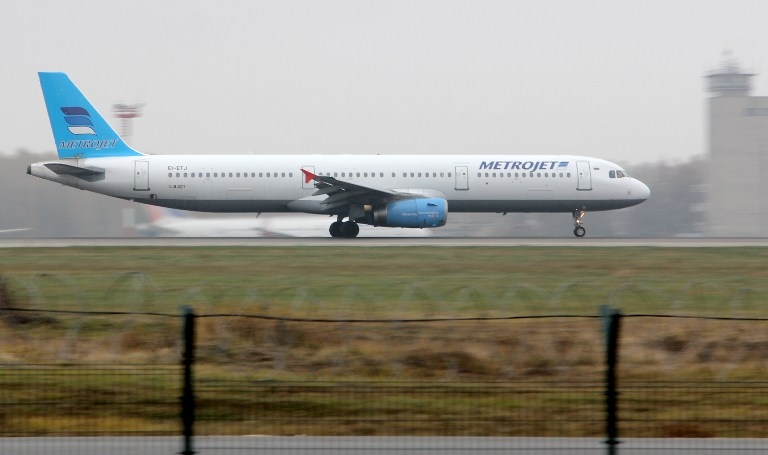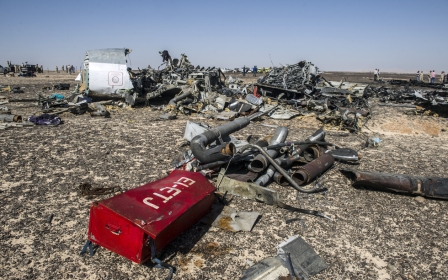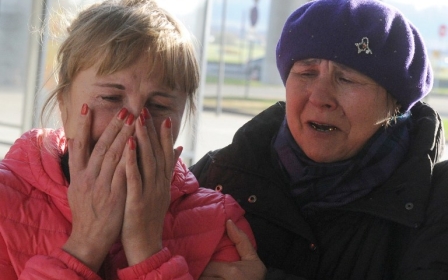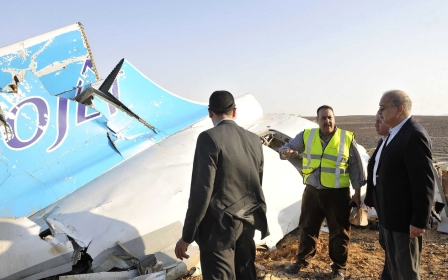Experts begin examining black boxes of crashed Russian jet

Investigators began their examination on Tuesday of the two black boxes from the Russian airliner that crashed in Egypt's Sinai Peninsula, as President Abdel Fattah al-Sisi said the probe would take time.
Sisi described a claim by the Egyptian branch of the Islamic State group that it downed the Airbus A321 that crashed on Saturday killing all 224 people on board as "propaganda".
The examination of the black boxes - one which recorded on-board conversations and the other flight data - started around midday (1000 GMT), an Egyptian civil aviation ministry official told AFP.
The probe could last several weeks or months if the recordings in the black boxes have been damaged, sources said. Russia's government commission overseeing the investigation was also due to meet on Tuesday.
The Saint Petersburg-bound plane operated by Russian airline Kogalymavia crashed 23 minutes after taking off from the Red Sea resort of Sharm el-Sheikh.
Most of the passengers were Russian tourists.
Kogalymavia said the plane crashed due to "external action," and that there was no technical fault or human error. It insisted the aircraft was in "excellent technical condition".
A US infrared satellite has detected a heat flash in the area at the time the plane came down, a US official said on Tuesday.
The heat flash could have been caused by some kind of blast on board the plane, the official told NBC News, for example a fuel tank exploding or a bomb.
According to the official, the satellite data rules out a surface-to-air missile as the cause of the disaster.
IS claim 'propaganda'
Within hours of the crash, the Egyptian affiliate of IS based in the Sinai claimed it had downed the jet in retaliation for Russian air strikes targeting fellow fighters in Syria.
"When there is propaganda that it crashed because of ISIS, this is one way to damage the stability and security of Egypt and the image of Egypt," Sisi told the BBC, using an alternative acronym for IS.
"The plane was at 35,000 feet (10,668 metres) altitude. Believe me, the situation in Sinai - especially in this limited area - is under our full control."
Sisi warned the probe could take years as in the case of Pan-Am flight 103 from London to New York that was brought down by a bomb and crashed into the Scottish town of Lockerbie in 1988.
"It takes time to clarify the incidents. You had the Pan-American that crashed over Europe. It took years before you reached the truth about the real reasons why it crashed," Sisi said.
On Monday, US director of national intelligence James Clapper said it was "unlikely" that IS was involved in the Kogalymavia plane crash but did not rule out the possibility.
Alexander Neradko, head of Russia's aviation authority, criticised the airline's comments ruling out technical fault or human error, saying they were "premature and not based on any real facts".
Cairo, Moscow and Washington have downplayed the IS claim, although analysts have not ruled out that a bomb may have been planted on board.
Experts say the fact that debris and bodies were strewn over a wide area points to a mid-air disintegration of the aircraft unlike most air crashes.
They said that left two possibilities - a technical fault that caused the plane to disintegrate, or an explosion caused by a bomb smuggled on board.
Search operations have been extended to a radius of 40 kilometres.
'Huge tragedy'
President Vladimir Putin has described the crash - Russia's worst air disaster - as a "huge tragedy".
"Without any doubt everything must be done to create an objective picture of events so that we know what happened and can react accordingly," he said.
Kremlin spokesman Dmitry Peskov said that in the investigation Moscow "cannot exclude any version" of events but warned against "guessing" the cause of the crash.
Relatives of those who died in the crash have begun the painful process of identifying their loved ones after two planes delivered the remains of many of the victims to Saint Petersburg.
"The process of identification has begun. It is complex, meticulous work," Saint Petersburg deputy governor Igor Albin told journalists Monday outside the crematorium where the remains are being stored.
Family members had already been providing DNA samples at a crisis centre set up near Saint Petersburg's Pulkovo airport, now the site of an impromptu memorial where people have brought flowers and cuddly toys to commemorate the victims, many of them children.
New MEE newsletter: Jerusalem Dispatch
Sign up to get the latest insights and analysis on Israel-Palestine, alongside Turkey Unpacked and other MEE newsletters
Middle East Eye delivers independent and unrivalled coverage and analysis of the Middle East, North Africa and beyond. To learn more about republishing this content and the associated fees, please fill out this form. More about MEE can be found here.




